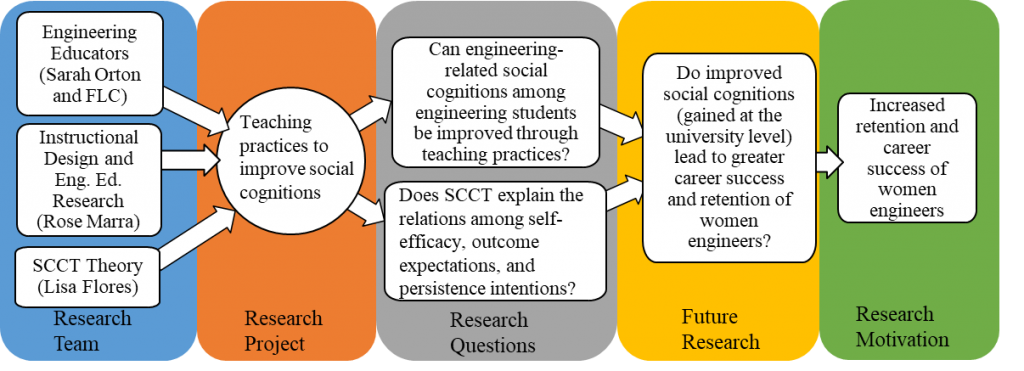Improving Engineering-Related Social Cognitions through Teaching
Posted in: Funded Research and InitiativesPoint of Contact: Dr. Rose Marra at marrar@missouri.edu
The project Improving Engineering-Related Social Cognitions through Teaching is based on work supported by the National Science Foundation under Grant No. 1926480.
The goal of this project is to assess the impact of teaching practices that can lead to improved self-efficacy and outcome expectations of engineering students, in particular women engineering students. In this project, researchers create a learning community comprised of engineering faculty to learn about social cognitive-based teaching practices. In this Engineering Faculty Learning Community (EFLC), researchers support faculty in designing and implementing these teaching practices. In addition, students in faculty’s course are invited to complete surveys voluntarily and confidentially, which measure their social cognitions (i.e., self-efficacy, outcome expectations, persistence intentions). PI: Dr. Sarah Orton, Associate Professor Civil Engineering, CO-PIs: Dr. Rose Marra, Professor and Director SISLT; Dr. Lisa Flores, Professor Psychology
Specifically, the data from the student assessments as well as the faculty independent reviewer evaluations will be analyzed to determine the answers to the proposed research questions:
- Research Question 1. Can engineering-related social cognitions among engineering students be improved through teaching practices?
- Research Question 1a. Are social cognitive-based teaching practices positively correlated with increases in self-efficacy and outcome expectations?
- Research Question 1b. Are increases in self-efficacy and outcome expectations sustained through the subsequent semester?

Rose Marra
Professor Rose M. Marra is the Director of the School of Information Science and Learning Technology at the University of Missouri. She is PI of the NSF-funded Supporting Collaboration in Engineering Education, and has studied and published on engineering education, women and minorities in STEM, online learning, and assessment. Dr. Marra holds a PhD. in Educational Leadership and Innovation and worked as a software engineer before entering academe.
Sarah Orton
Dr. Orton is an associate professor in Civil Engineering and is an active member of the American Concrete Institute and the American Society of Civil Engineers. Dr. Orton also serves as the Director of Undergraduate Studies for the Civil and Environmental Engineering Department at the University of Missouri. She has participated in several programs aimed at improving undergraduate education. Her research projects have involved the use of carbon fiber reinforced polymers to strengthen structures, analysis, and testing for reinforced concrete frames under disproportionate collapse, and risk and reliability analysis of bridges and offshore structures. She is a registered professional engineer in Missouri.
Lisa Flores
Lisa Y. Flores, Ph.D. is a Professor of Counseling Psychology at the University of Missouri. She has expertise in the career development of Latino/as and Latino/a immigrant issues and has 80 peer reviewed journal publications, 19 book chapters, and 1 co-edited book and presented over 200 conference presentations in these areas. She has been PI and co-PI on grants funded by NSF and USDA to support her research. She is Editor of the Journal of Career Development and past Associate Editor of the Journal of Counseling Psychology, and has served on the Editorial Boards of the Journal of Vocational Behavior, The Counseling Psychologist, Journal of Counseling Psychology, and Career Development Quarterly.
Fan Yu
Fan Yu is a doctoral student at the School of Information Science and Learning Technologies at the University of Missouri-Columbia. Fan received her MS in Elementary Education Science and a graduate certificate in Curriculum and Instructions. Fan’s research interests include STEM education and UX design in learning technologies. She concerns about how learning technologies encourage students from underrepresented groups to study and work in STEM fields.
Johanna Milord
Johanna Milord is a Counseling Psychology Doctoral Candidate at the University of Missouri. She earned her Masters of Science degree in Mental Health Counseling. Her general research focus is marginalized populations’ attainment of their desired academic and career outcomes. Her most recent projects have explored career self-efficacy and critical race consciousness interventions.